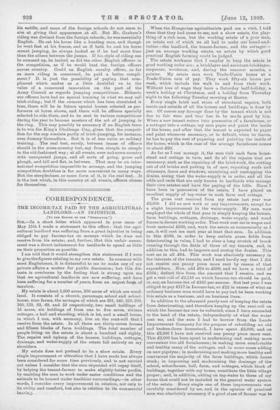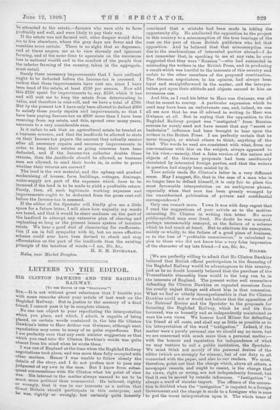CORRESPONDENCE.
THE INCOME-TAX PAID BY THE AGRICULTURAL LANDLORD.—AN INJUSTICE.
[To TUU EDITOR OF TOD " BPROTATOR.1
SIR,—In a short letter which appeared in your issue of May 15th I made a statement to this effect: that the agri- cultural landlord was suffering from a great injustice in being obliged to pay Income-tax on moneys which Ile does not receive from his estate; and, further, that this unfair assess- ment was a direct inducement for landlords to spend as little on their properties as possible.
I am told that it would strengthen this statement if I were to give the figures relating to my own estate. In common with most Englishmen, it is distasteful to me to make any of my private affairs a matter for public discussion; but this dis- taste is overborne by the feeling that is strong upon me that we agricultural landlords are now suffering, and have been suffering for a number of years, from an unjust Lugo of taxation.
My estate is about 1,800 acres, 200 acres of which are wood- land. It consists of a church, parsonage, school and school- house, nine farms, the acreages of which are 291, 245, 219, 200, 160, 129, 83, 69, and 53 respectively, two small holdings of 15 acres, six holdings of from one to five acres, sixteen cottages, a ball and shooting, which is let, and a small house, in which I can, with economy, live on the rent-roll that I receive from the estate. In all there are thirty-seven houses and fifteen blocks of farm buildings. The total number of people living on the estate is about a hundred and eighty. The repairs and upkeep of the houses, buildings, cottages, drainage, and water-supply of the estate fall entirely on my shoulders.
My estate does not pretend to be a show estate. Every single improvement or alteration that I have made has always been considered for some time previously, and is not carried out unless I consider that the sum expended will repay itself, by helping the tenant-farmer to make slightly .better profits, by enabling the men to work under easier conditions and the animals to be housed under healthier surroundings,—in other words, I consider every improvement in relation, not only to its utility and comfort, but also in relation to its commercial bearing. When the Hungarian agriculturists paid me a visit, I told them that they had come to see, not a show estate, the play- thing of a rich man, but the working estate of a poor man, an estate out of which we all had to make our bread-and- butter—the landlord, the tenant-farmer, and the cottager–, just an average working estate, an estate by which good practical English farming could be judged.
The estate workmen that I employ to keep the estate in good working order are: a bricklayer and assistant-bricklayer, carpenter, woodman, and, during the summer months, a painter. My estate men work Trade-Union hours at a Trade-Union rate of pay. They work fifty-six hours per week, which include the walk to and from their work. Without loss of wage they have a Saturday half-holiday, a week's holiday at Christmas, and a holiday from Thursday night to the following Tuesday morning at Easter.
Every single brick and stone of structural repairs, both inside and outside of all the houses and buildings, is done by me. Of course any damage done by the tenant which is not due to fair wear and tear has to be made good by him. W hen a new tenant enters into possession of a farmhouse, or cotteger into a cottage, my men paper and paint the inside of the house, and after that the tenant is expected to paper and paint whenever necessary, or in default, when he leaves, he has to pay the cost of papering and painting the inside of the house, which in the case of the average farmhouse conies to about 220.
As far as I can manage it, the men visit each farm home- stead and cottage in turn, and do all the repeirs that are necessary, such as the repairing of the brickwork, the cutting out of old bricks and putting in of new, repairing roofs and chimneys, doors and windows, examining and unstopping the drains, seeing that the water-supply is in order, and all the odds and ends that are only known to landlords who manage their own estates and have the paying of the bills. Since I have been in possession of the estate, I have placed an excellent supply of tap-water in each farm and cottage.
The gross rent received from my estate last year was 2200. I did no new work or any improvements, except for a slight improvement to the water-supply. My men were employed the whole of that year in simply keeping the .houses, farm buildings, cottages, drainage, water-supply, and wood fences in decent working order. That work cost me in wages and fresh material 2500, and, work the estate as economically as I can, it will cost me each year at least that sum. In addition to this 2500, in order . to keep certain grass fields from deteriorating in value, I lied to clear a long stretch of brook running through the fields of three of my tenants, and, in addition to this, had to improve and unstop the drains. This cost me in all 264. This work was absolutely necessary in the interests of the tenants, and I need hardly say that I did not receive one penny piece more rent by reason of that expenditure. Now, add 264 to 2500, and we have a total of £564; deduct this from the amount that I receive, and we get a rent-roll of 22,116 on which Income-tax should be paid, or, say, an Income-tax of 2105 per annum. But last year I was obliged to pay 2117 in Income-tax, or 212 in excess of what an ordinary business man would have to pay had he been working this estate as a business, and on business lines.
In addition to the aforesaid yearly cost of keeping the estate from deteriorating, and therefore keeping up the rent-roll on which the Income-tax can be collected, since I have succeeded to the head of the estate, independently of what the water cost me, and the sum I had to borrow from the Lauds Improvement Company for the purpose of rebuilding an old and broken-down homestead, I have spent 22,000, and on this 22,000 I have not received one penny piece more rent.
This 22,000 has been spent in modernising and making more convenient two old farmhouses ; in making more comfortable and healthy many of the cottages, and in some oases adding on new pigstyes; in modernising and making more healthy and convenient the majority of the farm buildings, which house stock; in improving and modernising the drainage of the school, schoolhouse, hall, farm, and cottages, which block of buildings, together with my house, constitute the little village proper; and, in addition, adding on tap-water to three of my farms that could not be included in the general water system of the estate. Every single one of these improvements was carefully considered by me, and in the opinion of practical men was absolutely necessary if a good class of farmer was to be attracted to the estate,—farmers who were able to farm profitably and well, and were likely to pay their way.
If the estate was not farmed well, utter despair would drive ; the to live elsewhere, where the grey days are fewer and the sunshine more certain. There is no sight that so depresses, and at times augers, me as to view slovenly and ignorant farming, and at the same time to speculate on the enormous loss in national wealth and in the comfort of the people that the inferior farming of the country, taken in the aggregate, must entail.
Surely these necessary improvements that I have outlined ought to be deducted before the Income-tax is assessed. I reckon that these improvements have cost me, since I have been head of the estate, at least 2150 per annum. Now add this 2150 spent for improvements to, say, £550, which it has and will cost me to keep the estate from deteriorating in value, and therefore in rent-roll, and we have a total of £700. But by the present law I have only been allowed to deduct 2350 to satisfy these yearly repairs and improvements, so that I have been paying Income-tax on £350 more than I have been receiving from my estate, and this, spread over many years, amounts to a very considerable sum.
Is it unfair to ask that an agricultural estate be treated as a business concern, and that the landlords be allowed to state on their Income-tax papers the amount they actually receive after all necessary repairs and necessary improvements in order to keep their estates as going concerns have been deducted, and if the Income-tax collector doubts these returns, then the Jandlords should be allowed, as business men are allowed, to send their books in, in order to prove whether their returns are correct ?
The land is the raw material, and the upkeep and gradual modernising of houses, farm buildings, cottages, drainage, water-supply are part of the expenses which have to be incurred if the land is to be made to yield a profitable return. Surely, then, all such legitimate working expenses and improvements ought to be deducted from the gross rent-roll before the Income-tax is assessed.
If the editor of the Spectator will kindly give me a little Space for a future letter, I will show bow unjustly my woods are taxed, and that it would be sheer madness on the part of the landlord to attempt any extensive plan of clearing and replanting so long as the present insane system of taxation exists. We hear a good deal of clamouring for reafforesta- tion (I am in full sympathy with it), but no more effective scheme could ever have been devised to check and stop nfforestation on the part of the landlords than the existing principle of the taxation of woods.—I am, Sir, &c., Hales, near Market Drayton. H. B. M. BUCHANAN.











































 Previous page
Previous page